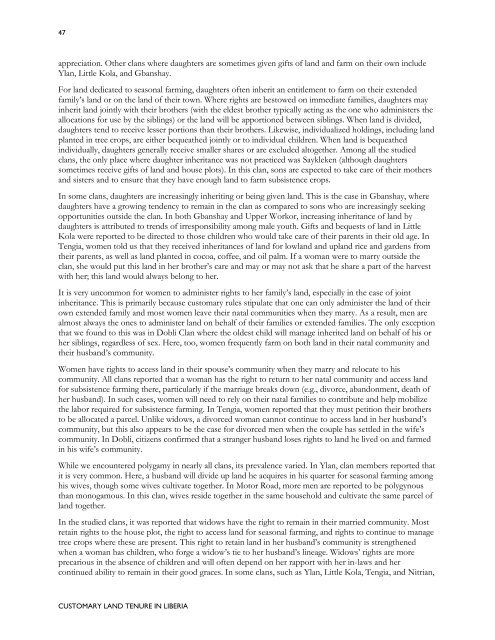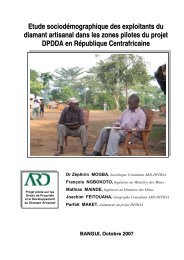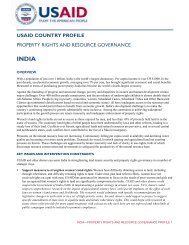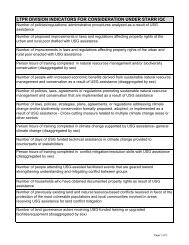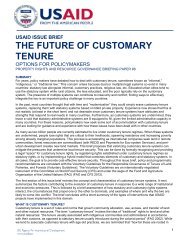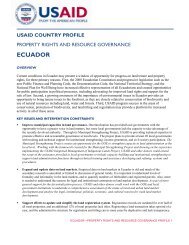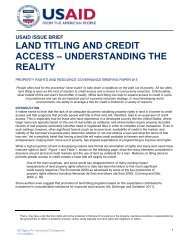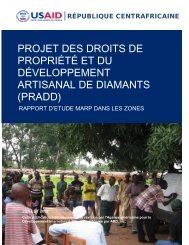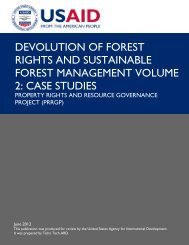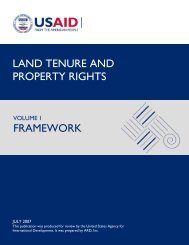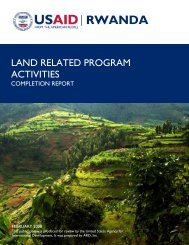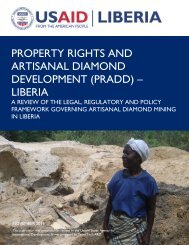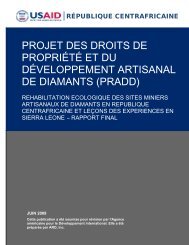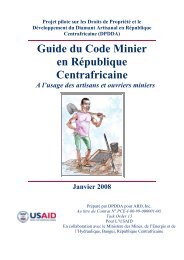Customary Land Tenure in Liberia - Land Tenure and Property ...
Customary Land Tenure in Liberia - Land Tenure and Property ...
Customary Land Tenure in Liberia - Land Tenure and Property ...
You also want an ePaper? Increase the reach of your titles
YUMPU automatically turns print PDFs into web optimized ePapers that Google loves.
47<br />
appreciation. Other clans where daughters are sometimes given gifts of l<strong>and</strong> <strong>and</strong> farm on their own <strong>in</strong>clude<br />
Ylan, Little Kola, <strong>and</strong> Gbanshay.<br />
For l<strong>and</strong> dedicated to seasonal farm<strong>in</strong>g, daughters often <strong>in</strong>herit an entitlement to farm on their extended<br />
family‟s l<strong>and</strong> or on the l<strong>and</strong> of their town. Where rights are bestowed on immediate families, daughters may<br />
<strong>in</strong>herit l<strong>and</strong> jo<strong>in</strong>tly with their brothers (with the eldest brother typically act<strong>in</strong>g as the one who adm<strong>in</strong>isters the<br />
allocations for use by the sibl<strong>in</strong>gs) or the l<strong>and</strong> will be apportioned between sibl<strong>in</strong>gs. When l<strong>and</strong> is divided,<br />
daughters tend to receive lesser portions than their brothers. Likewise, <strong>in</strong>dividualized hold<strong>in</strong>gs, <strong>in</strong>clud<strong>in</strong>g l<strong>and</strong><br />
planted <strong>in</strong> tree crops, are either bequeathed jo<strong>in</strong>tly or to <strong>in</strong>dividual children. When l<strong>and</strong> is bequeathed<br />
<strong>in</strong>dividually, daughters generally receive smaller shares or are excluded altogether. Among all the studied<br />
clans, the only place where daughter <strong>in</strong>heritance was not practiced was Saykleken (although daughters<br />
sometimes receive gifts of l<strong>and</strong> <strong>and</strong> house plots). In this clan, sons are expected to take care of their mothers<br />
<strong>and</strong> sisters <strong>and</strong> to ensure that they have enough l<strong>and</strong> to farm subsistence crops.<br />
In some clans, daughters are <strong>in</strong>creas<strong>in</strong>gly <strong>in</strong>herit<strong>in</strong>g or be<strong>in</strong>g given l<strong>and</strong>. This is the case <strong>in</strong> Gbanshay, where<br />
daughters have a grow<strong>in</strong>g tendency to rema<strong>in</strong> <strong>in</strong> the clan as compared to sons who are <strong>in</strong>creas<strong>in</strong>gly seek<strong>in</strong>g<br />
opportunities outside the clan. In both Gbanshay <strong>and</strong> Upper Workor, <strong>in</strong>creas<strong>in</strong>g <strong>in</strong>heritance of l<strong>and</strong> by<br />
daughters is attributed to trends of irresponsibility among male youth. Gifts <strong>and</strong> bequests of l<strong>and</strong> <strong>in</strong> Little<br />
Kola were reported to be directed to those children who would take care of their parents <strong>in</strong> their old age. In<br />
Tengia, women told us that they received <strong>in</strong>heritances of l<strong>and</strong> for lowl<strong>and</strong> <strong>and</strong> upl<strong>and</strong> rice <strong>and</strong> gardens from<br />
their parents, as well as l<strong>and</strong> planted <strong>in</strong> cocoa, coffee, <strong>and</strong> oil palm. If a woman were to marry outside the<br />
clan, she would put this l<strong>and</strong> <strong>in</strong> her brother‟s care <strong>and</strong> may or may not ask that he share a part of the harvest<br />
with her; this l<strong>and</strong> would always belong to her.<br />
It is very uncommon for women to adm<strong>in</strong>ister rights to her family‟s l<strong>and</strong>, especially <strong>in</strong> the case of jo<strong>in</strong>t<br />
<strong>in</strong>heritance. This is primarily because customary rules stipulate that one can only adm<strong>in</strong>ister the l<strong>and</strong> of their<br />
own extended family <strong>and</strong> most women leave their natal communities when they marry. As a result, men are<br />
almost always the ones to adm<strong>in</strong>ister l<strong>and</strong> on behalf of their families or extended families. The only exception<br />
that we found to this was <strong>in</strong> Dobli Clan where the oldest child will manage <strong>in</strong>herited l<strong>and</strong> on behalf of his or<br />
her sibl<strong>in</strong>gs, regardless of sex. Here, too, women frequently farm on both l<strong>and</strong> <strong>in</strong> their natal community <strong>and</strong><br />
their husb<strong>and</strong>‟s community.<br />
Women have rights to access l<strong>and</strong> <strong>in</strong> their spouse‟s community when they marry <strong>and</strong> relocate to his<br />
community. All clans reported that a woman has the right to return to her natal community <strong>and</strong> access l<strong>and</strong><br />
for subsistence farm<strong>in</strong>g there, particularly if the marriage breaks down (e.g., divorce, ab<strong>and</strong>onment, death of<br />
her husb<strong>and</strong>). In such cases, women will need to rely on their natal families to contribute <strong>and</strong> help mobilize<br />
the labor required for subsistence farm<strong>in</strong>g. In Tengia, women reported that they must petition their brothers<br />
to be allocated a parcel. Unlike widows, a divorced woman cannot cont<strong>in</strong>ue to access l<strong>and</strong> <strong>in</strong> her husb<strong>and</strong>‟s<br />
community, but this also appears to be the case for divorced men when the couple has settled <strong>in</strong> the wife‟s<br />
community. In Dobli, citizens confirmed that a stranger husb<strong>and</strong> loses rights to l<strong>and</strong> he lived on <strong>and</strong> farmed<br />
<strong>in</strong> his wife‟s community.<br />
While we encountered polygamy <strong>in</strong> nearly all clans, its prevalence varied. In Ylan, clan members reported that<br />
it is very common. Here, a husb<strong>and</strong> will divide up l<strong>and</strong> he acquires <strong>in</strong> his quarter for seasonal farm<strong>in</strong>g among<br />
his wives, though some wives cultivate together. In Motor Road, more men are reported to be polygynous<br />
than monogamous. In this clan, wives reside together <strong>in</strong> the same household <strong>and</strong> cultivate the same parcel of<br />
l<strong>and</strong> together.<br />
In the studied clans, it was reported that widows have the right to rema<strong>in</strong> <strong>in</strong> their married community. Most<br />
reta<strong>in</strong> rights to the house plot, the right to access l<strong>and</strong> for seasonal farm<strong>in</strong>g, <strong>and</strong> rights to cont<strong>in</strong>ue to manage<br />
tree crops where these are present. This right to reta<strong>in</strong> l<strong>and</strong> <strong>in</strong> her husb<strong>and</strong>‟s community is strengthened<br />
when a woman has children, who forge a widow‟s tie to her husb<strong>and</strong>‟s l<strong>in</strong>eage. Widows‟ rights are more<br />
precarious <strong>in</strong> the absence of children <strong>and</strong> will often depend on her rapport with her <strong>in</strong>-laws <strong>and</strong> her<br />
cont<strong>in</strong>ued ability to rema<strong>in</strong> <strong>in</strong> their good graces. In some clans, such as Ylan, Little Kola, Tengia, <strong>and</strong> Nitrian,<br />
CUSTOMARY LAND TENURE IN LIBERIA


